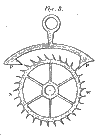|
If
you want more information on these inventions, the U.S.
Patent Office maintains a decent search engine, or you
can try free commercial services like google or FreePatentsOnline.
Commercial
sites to help launch your inventing career include the Patent
Cafe, a specialize portal for the field, and Inventor Spot, a compendium of inventions and resources from around the world.
The
National Inventor
Fraud Center (despite its name, the web site of a patent
attorney) does contain much sane advice on how to avoid
patent scams and negotiate a license. Also many interesting
links.
The
Canadian Government helps subsidize an excellent patent
development organization at the The
University of Waterloo. Sound advice, by a nonprofit.
Finally,
visit this marvelous site at the University of Houston-
host of Nation Public Radio's The
Engines of Ingenuity. Hundreds of fascinating stories
about invention and inventors.
But
you should remember patents are only one step on the long
road to commercialization. Indeed, it is the EASIEST step-
the hardest part is finding a manufacturer, building a business,
and convincing customers to share your dream. While paranoia
is healthy in any business endeavor, most inventors are
excessively secretive about their ideas. From long and painful
experience, your biggest problem is not having someone "steal"
your concept while it is still only a dream, but rather,
that no one knows the idea exists. The best protection is
a patent, publicity and a successful business case- not
secrecy.
Remember-
few inventors invent to make money- they do so because they
can't help themselves.
You can explore summaries of these patents by topic area (above), or search all my patents at the USPTO or google |







